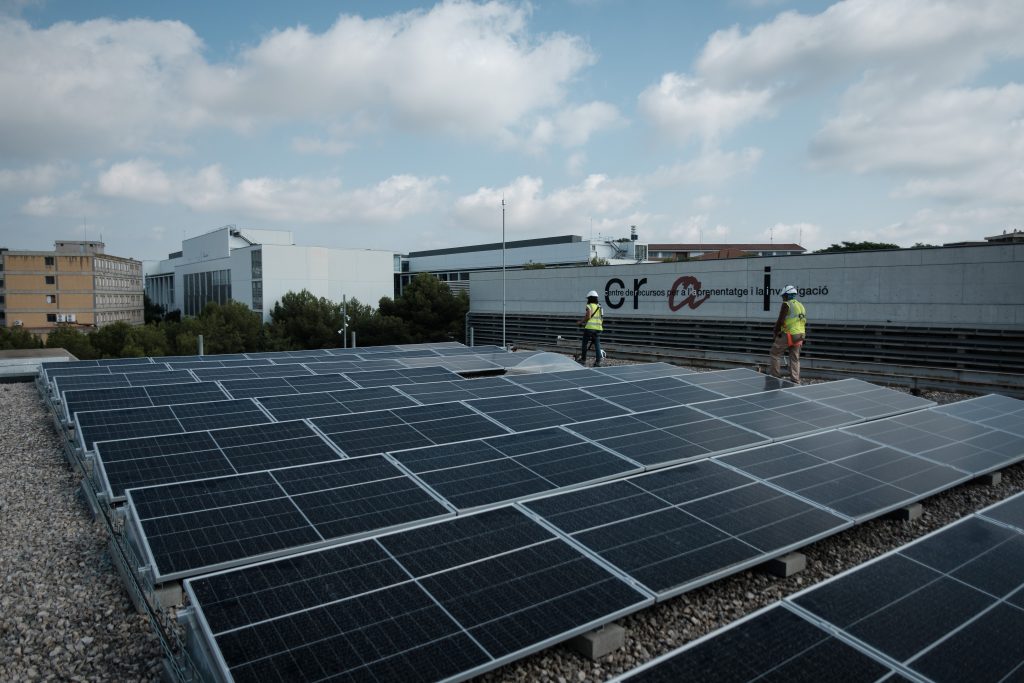27/10/2022
The University designs an emergency plan to reduce energy consumption by 20% in 2023
The plan is a response to the predicted increase in expenditure from the current 2.3 million euros to more than 7 million euros if the current level of consumption and prices stay the same.

The plan is a response to the predicted increase in expenditure from the current 2.3 million euros to more than 7 million euros if the current level of consumption and prices stay the same.
Energy supply is one of the URV’s biggest expenses, with a budgeted expenditure for 2022 of 2.3 million euros. However, the surge in the energy market and the end of the syndicated energy contract of the Catalan universities means that the predicted expenditure, according to the latest available reference prices, will be around 5 million euros more next year if no action is taken. For this reason, in parallel to the negotiation of the consortium’s energy procurement system, the Governing Council has approved an energy emergency plan designed to reduce gas and electricity consumption, which will have an impact on energy bills.
The plan has two main aims: to improve energy efficiency and to improve use and management. The first aim is in the medium and long term and is a response to the structure of campuses and facilities throughout the region. It includes making improvements to infrastructures, renewing the air-conditioning, lighting systems and envelopes, the sectorialisation of the air-conditioning and lighting system so that areas of buildings can be divided in terms of their use, and renewing the monitoring network and the energy certification of the buildings.
This first aim involves the URV producing its own energy with solar panels, something that was already being done and which is described in the Environmental Sustainability and Climate Action Plan. The first phase of the project is already being deployed at the Catalunya and Sescelades campuses (Tarragona). In subsequent phases, more panels will be installed at the Sescelades campus, and the first panels will be installed at the Terres de l’Ebre campus and the Bellissens campus (Reus). Nevertheless, the generation of energy from this renewable source will account for only 6.6% of total consumption once all the phases have been completed. With the execution of other phases that have yet to be programmed and considering that consumption will fall, this figure could reach 15-20%.
The most immediate actions, however, are to improve use and management. To this end, a governance committee will be set up, which will be responsible for drawing up the overall guidelines applicable to all the faculties, schools and campuses, and the different faculties, schools and consumer units will evaluate the guidelines and also propose measures for individual sectors through what are known as energy efficiency teams, with representation from members and managers of the faculties, schools and the Material Resources Service.
With regard to the timetable for the plan approved today, the monitoring system will be reviewed during the remainder of the year, working groups will be set up and the first measures will be implemented. In 2023, implementation will continue and continuous evaluation will begin in order to maximise the effects of rationalisation until consumption can be reduced by 20%. In subsequent years, savings measures will continue with the aim of maintaining the reduction in consumption and expenditure at 10% per year from 2024. The plan will be fully reviewed in 2026.
The plan is a framework document and gives faculties, schools and campuses some power to decide on measures for particular sectors. According to Juan Antonio Duro, vice-rector for Economics, Infrastructures and Institutional Relations, it is now a matter of “small decisions being taken by the university community to achieve the 20% saving in consumption”, as well as “capturing as many external resources as possible to make investments that will allow us to be more efficient”.
At the same time, the Catalan universities are negotiating a system of purchasing energy as a consortium, and the Governing Council has approved an annual expenditure for energy for the period 2023-26. This expenditure for 2023 amounts to 6.45 million euros excluding VAT supplies. It should be borne in mind that 73% of the URV’s energy consumption is electricity and 27% is gas.
